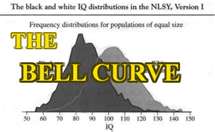 The Bell Curve was a novel written by a Libertarian in 1994 that took an analytical look at intelligence using IQ testing as the backbone for its conclusion. To say it was highly controversial is to accurately portray its reception. In addition to libertarian Charles Murray it was co-authored by Richard J. Herrnstein a professor at Harvard.
The Bell Curve was a novel written by a Libertarian in 1994 that took an analytical look at intelligence using IQ testing as the backbone for its conclusion. To say it was highly controversial is to accurately portray its reception. In addition to libertarian Charles Murray it was co-authored by Richard J. Herrnstein a professor at Harvard.
The book argues that intelligence is primarily a product of genetic inheritance (40% to 80%) and secondarily to environmental factors and an excellent predictor of success in life at almost every level. It based the results on IQ scores of large groups of people and their eventual outcomes in life. It looked at education, criminality, age at which children were born, salary, and other life defining issues.
The reason it generated so much controversy is that it suggested that inheritance of intelligence played the predominant predictive factor although it stops well short of suggesting this is the only factor. It also points to the undeniable difference in IQ scores with whites and Asians scoring significantly higher than other races.
The recommendations from the book included ending most welfare programs, ending affirmative action, and reducing immigration. It couched most of these recommendations in the idea that poor people have bad IQ scores and yield children with the same issue. Also, that the poor tend to have far more children than the wealthy and this imbalance has the effect of making the United States less intelligent as a whole. It generally spoke in terms if income not race but the implication is undeniable.
It predicted a stratification in society wherein the middle class would diminish and the gap between the wealthy and the poverty ridden would mirror that which we see in poor Latin American countries. Thus the wealthy whites and Asians would live in fenced communities protected from the poor masses of other races. It predicted the conservative movement would be subverted into a philosophy that focused on doing anything to preserve its wealth and an eventual turn of government towards totalitarianism.
Dire predictions indeed.
There are a number of criticisms of the book in particular as to its assignment of IQ test results as the primary source of its base assertion of intelligence. I’m not going to get into them all here but I’ll talk about a few before I wrap it up.
Many criticize the idea that intelligence can be summed up in a single number, the IQ test result. They claim intelligence is much more complex than this. The manipulation of the final IQ score through the g-factor is relatively arbitrary and when scored as it was on the test overstates the difference in IQ between races. A number of follow-up studies using the same methodology have produced less dramatic results in scoring gap between races.
Many point out that immigrants of all nationalities, Jewish, Irish, Italian, etc. have traditionally done poorly on Intelligence Tests and that as they amalgamated with society saw dramatic increases. This would seem to indicate a bias in the IQ test towards the culture of the people giving the test and argue against the immigration policies suggest by the book.
Charles Murray answered many of these criticisms with a follow-up of the book using siblings for his study. The siblings he used were chosen because of a wide divergence in their IQ scores. He then analyzed the life accomplishments of the high scorer with those of the low scorer. The results of this test validated the original test although the gap in accomplishments was somewhat narrower than the original.
I’m going to save my conclusions of IQ tests and intelligence as a whole until tomorrow but I will state that there is a great deal of validity to the idea that smarter people do better in life. That the higher the ratio of smart people to stupid people we have in the United States the more likely it is our country will prosper. I am skeptical of IQ testing as an absolute measure of real intelligence and I’m also skeptical of racial causality of gaps in intelligence testing scores. I’ll get more into those topics when I conclude tomorrow.
Today I hope that I gave you some insight into an interesting book that, at its base, was trying to formulate policies that would increase the average intelligence of people in our country. That’s a worthy goal.
Tell me what you think about this controversial subject in the comments and share away!
Tom Liberman
Sword and Sorcery fantasy with a Libertarian Twist